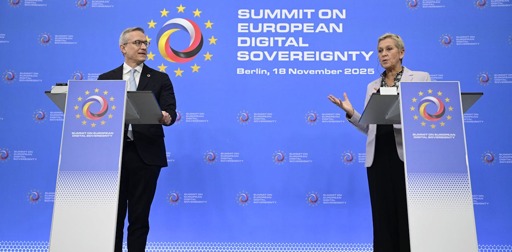…
Following … Trump’s win [in the US presidential election last year], and amid the first year of the new US administration, members of the European parliament … have swung towards the sovereignty paradigm with a new fervour, embracing an enforcement-focused legal “simplification” agenda that borders on deregulation, and supporting research for funding and policy proposals that would likely have seemed farfetched even two years ago. Ideas for public service media alternatives include an AI-powered “European News Streaming Platform”. And then there’s the EuroStack, an initiative for investment in Europe-based digital infrastructures.
The news platform is still somewhat speculative, but the EuroStack initiative has gained significant traction in Brussels. The EU commissioner for technological sovereignty, Henna Virkunnen, spoke at a EuroStack event in June. Her speech came a little more than six months after a EuroStack pitch document criticised the bloc’s years of US-focused regulation as a misstep that has likely condemned the EU to a future “as a definitive and irreversible ‘US colony’ in digital infrastructure”. Today, as the European Commission “prepares to simplify digital rules with a new omnibus plan”, it appears that EU politicians’ belief in the optimistic, constitutionalist paradigm has significantly deteriorated, if not collapsed.
But old habits die hard, and the EU has for decades been described as a “regulatory state” that effects change primarily through legal rulemaking. It must now resist slipping back into that comfort zone, and also take care, while simplifying the rules, not to destroy the essence of the regulations it has built. If the EU is to offer a genuinely alternative and rights-conscious vision of the internet, it must cast off idealistic visions of achieving hegemony through law and redirect its energies towards technological creation. Initiatives like the Eurostack and the European News Streaming Platform appear to offer promising places to start.
[Edit typo.]
Henna Virkunnen is on X, Facebook, Instagram, LinkedIn, and BlueSky.
But not Mastodon.Many European politicians have no EU platform, but I’ve started to see it more and more.
When I followed the development and passing of the DSA/DMA I always envisioned that it would cause American big tech to leave the EU and a new stack would emerge from the European open source ecosystem. The EU, member states, and local governments have also been funding open source projects to this end (Next Generation internet, NGI).
I was a bit optimistic about the speed. I remember telling my family that the interoperability requirement of chat services would demolish the big tech hemegony by the end of the decade.
I don’t think this will happen that quickly anymore. But what the author describes as a shifting of the focus towards the creation of a “eurostack”, I would describe as the natural and intentional consequence of regulating big tech into respecting European civil rights.
Overall I’m still pretty optimistic of the growth of european open source projects replacing US big tech.



